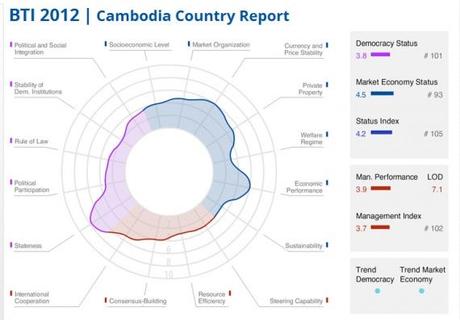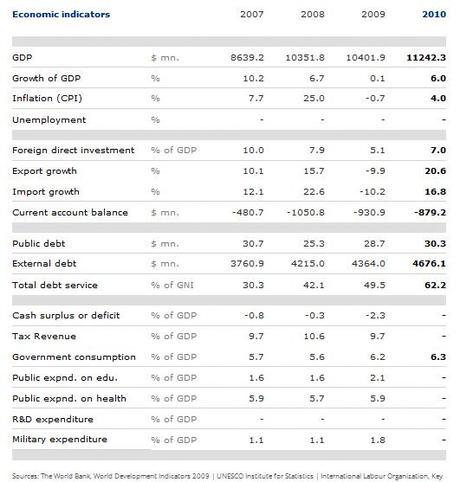Learning from transformation experiences worldwide.
Successful transformation processes toward democracy based on the rule of law and a market economy flanked by socio-political safeguards are happening all around the world.

2012 • Transformationsindex - Cambodia.
But success is by no means guaranteed: in many cases, stagnation, power struggles and state failure are jeopardizing countries on their difficult path of transformation. Good governance is key to implementing successful reforms.
The project “Shaping Change – Strategies of Development and Transformation” (by Bertelsmann-Stiftung) aims to help improve the political management of these processes by analyzing strengths and weaknesses and facilitating the knowledge transfer of good practices.
Download Cambodian Country Report 2012:BTI 2012 | Cambodia Country Report.
Executive Summary
The major tendencies of the last several years continued in 2009 and 2010. The Cambodian People’s Party (CPP) strengthened its grip on Cambodian politics, further eroding the democratization process and stabilizing its de facto one-party rule. Economic growth halted in 2009 due to the global financial crisis and declines in both foreign investment and trade exports. However, the economy has begun to recover, owing to the dynamism of key sectors and targeted investment by the government. Persistent structural deficits including an unequal distribution of wealth, a growing gap between wealthy and poor Cambodians, and corruption prevent sustainable development. During the period under review, democratic institutions remained weak and in danger of eventually becoming meaningless. Prime Minister Hun Sen’s CPP won the 2009 district, province and city-council elections (with 74.73% of the votes). Since the parliamentary elections of 2008, the CPP has held 90 of 123 seats in the National Assembly; 43 of the 54 Senate seats subject to elections were taken by the CPP in the 2006 elections; and 7,993 of the 11,353 communal council votes were cast for the CPP in the 2007 elections. The CPP now dominates the entire political process, and holds a quasi-monopoly over all important democratic institutions. The opposition, in particular the Sam Rainsy Party (SRP) that placed second in all recent elections, remains subject to attacks by Hun Sen and his elites. Sam Rainsy was sentenced to two years in jail for racial incitement and property destruction after leading a group of protesters to an area of the Cambodian-Vietnamese border that is still a source of dispute between the two countries. As in 2005, Rainsy was stripped of his immunity to prosecution, and his case was eventually tried in October 2009 and again in September 2010. Rainsy was sentenced in absentia to an additional 10 years of jail time on charges of manipulating documents and misinforming the public. If these verdicts are not revoked, Rainsy will not be able to stand for the upcoming national elections in 2012. That would deal a severe blow to the opposition’s electoral chances. An ongoing legal dispute between Hun Sen and former women’s affairs minister (now SRP politician) Mu Sochua, focusing on charges of defamation, further demonstrates the politicized nature of the judiciary and the lack of independence from government interference.2012 • Transformationsindex - Cambodia.
Several new laws were introduced in 2009 and 2010. Among the most important were the long-awaited NGO law, a reformed penal code, and a draft anti-corruption law. All intended as guarantees of legal security, these laws are formulated so imprecisely that the right to define their application remains firmly in the hands of the executive. One of the most noted developments of 2010 was the trial against former Khmer Rouge leader Kang Kek Iev (“Duch”) who was the first to be convicted by the mixed tribunal. The verdict received a mixed welcome from the national and international press as an important step toward justice and reconciliation, but the sentence of 35 years (19 years after accounting for time already served) was decried by victims as too lenient.
After a slump in garment exports, construction and tourism, economic development is back on track. In 2010, the pace remained slow as a consequence of the global economic crisis (under 5% growth rate), but the Cambodian economy generally showed itself to be in recovery. The government’s monetary policies and a stable currency helped solidify generally positive macroeconomic developments. A few key sectors remain the main drivers of growth, with diversification repeatedly demanded by external experts.
To conclude, the state of Cambodia today has seen a further reversal of the democratization process, continues to be dependent on foreign assistance, has shown a diminished but still considerable trend toward economic growth, and displays massive deficiencies in the rule of law.
- http://www.bti-project.org/fileadmin/Inhalte/reports/2012/pdf/BTI%202012%20Cambodia.pdf



